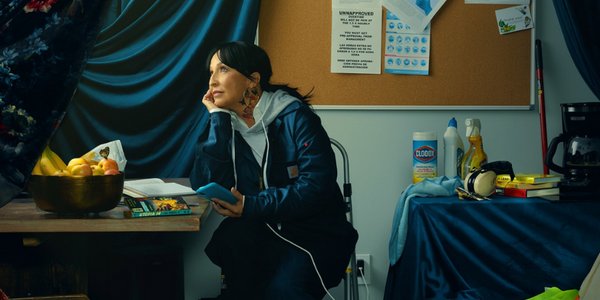Kiriwaitingi Rei-Russell: Guided by the past to walk towards the future
Kiriwaitingi Rei-Russell was reluctant to join her first board but hasn't looked back. She's among a new group of young Māori changemakers.

Our research, over 15 months of monthly surveys across 100,000+ people in ten countries, uncovered 8 critical personas of our age. Accounting for over half of the world’s population, they are at the forefront of 30 critical macro trends disrupting society and organisations, and account for trillions in global spend.
Who are “The New People Shaping Our Future?” New Collars getting the training they need for higher paid jobs, Virtual Natives who joined the workforce during the pandemic, and Climate Catalysts eager to engage business in solutions. There are also the Digital Bloomers who have become technology converts, and Citizens of the Metaverse who are tapping into augmented reality. The Hivemind Investor is rocking the investment world with independence and virtual communities. The Wellness Protagonist is now armed with data to focus on preventative health, and the Psychedelic Explorers are considering the therapeutic uses of psychedelics.
Representing more than half of the world’s population, they can’t be ignored. Explore what their needs mean for you as a director and the organisations you govern.

The Citizens of the Metaverse embody these four key macro trends:
The Citizens of the Metaverse (Metazens) are people willing to participate in the metaverse without hesitation. They are ready for the next iteration of the internet, poised to dive into the immersive and integrated parallel world it will forge. Buy a piece of real estate that only exists in the ether? Yes, please! Curate a collection of non-fungible tokens (NFTs) and make friends you've never met in person? Sure! Wear a device in your ear that tracks and analyses your every move? Why not!
In a way, this group is the extreme amalgamation of others. They embrace the virtual work lifestyle of the Virtual Natives, the investment attitudes of the Hivemind Investors, and the new age approach to wellbeing of the Wellness Protagonists. They are on the cutting edge of every technological frontier.
Placing immense trust in the direction of new technology, they are not naïve — they acknowledge there are risks involved. They're simply willing to take them, experiment with them, and pay for them. They want to enhance what they already use the internet for, then expand into uncharted territory. They are molding a new market and will shape how the metaverse emerges and becomes enmeshed into a global future.
Read more on the Citizens of the Metaverse.

The New Collars embody these four key macrotrends:
New Collars are blue-collar workers who used the pandemic to learn new skills so that they could find better jobs. Their transcendence of single-collar careers is helping lead a labour revolution. While the entire world felt the effects of the coronavirus to some degree, the impacts were not equal. Many blue-collar workers lost jobs as the pandemic began. When working, they clocked hours in person—putting themselves and their loved ones at risk—while they watched white-collar employees migrate to safe remote setups, with their jobs and pay protected.
Rather than accept this fate, many New Collars set their sights on new horizons. More optimistic, community-oriented, resilient, and risk-taking than the general population, they reinvented themselves. They learned new skills to get the compensation and flexibility they crave and deserve, and their hard work has started to pay off. Many are shifting to better jobs, creating an even tighter labour market as baby boomers also retire.
Blue-collar work remains a crucial component of the global economy, and while wages are rising, employers must act swiftly to close the gap between job demand and workers available given the accelerating departures.

The Hivemind Investors are at the forefront of these four key macro trends:
The Hivemind Investors are those for whom social media drives investment decisions. On the surface, they appear to have a penchant for chaos and disruption. They’ve generated an entire retinue, rife with a culture of self-deprecation and a hyperbolic anti-establishment sentiment. While seemingly antagonistic, our research reveals that underlying their seemingly volatile behaviour is a search for community, learning, and information equality as these newly minted investors dive into the world of retail investing.
In their DIY learning journeys, they’ve often leveraged online forums to make decisions based on popular trends and the instincts of the collective. Investing has become a way for them to find and build community, democratise financial markets and investing, and prove themselves capable of navigating the financial world. Through their sheer size alone, they have sway over the markets and will continue to have influence if their numbers continue to swell, but their ability to persist through more bearish market conditions remains to be seen.
To win the hearts of this cohort at the forefront of the new wave of retail investing, firms should seek to understand the underlying needs and values that drive them and establish guardrails to protect their long-term financial health.
Read more on the Hivemind Investors.

The Virtual Natives embody these four key macro trends:
The Virtual Natives graduated during the pandemic and have since joined the workforce in an almost exclusively remote capacity. They are redefining the very nature of white-collar employment and office structure — they work from their bed, their living room, a rental in Costa Rica. They spend their days glued to laptop screens, and — though inured to the routines of online life — they feel slighted, having missed out on celebrating milestones and fostering relationships in-person.
Yet the pandemic has allowed them to curate their professional surroundings to their specific habits, making them less willing to sacrifice comforts. Flexibility. Perks. High salaries. Regular recognition and praise. Their exacting expectations are becoming the norm as turnover rates continue to rise. To retain top talent, employers will have to cater to the demands of the Virtual Natives and others learning from them.
Read more on the Virtual Natives.

The Psychedelic Explorers embody these four key macro trends:
The Psychedelic Explorers are those intrigued by and willing to try psychedelics in a clinical or experiential setting. They are curious and open-minded, and as more of these therapies move closer to market, they will be in the vanguard of early adoption. As such, they will be at the forefront both in further de-stigmatising mental healthcare, and in transforming the outdated perception of the 1960s-era “hippy tripper.”
This group places a high value on validated scientific research — many are awaiting FDA approval and the confidence of controlled doses and environments before taking the plunge. Some have already dabbled, but they take their experiences in this realm seriously and feel their experiences have supported them on their personal journeys.
The increasing numbers of Explorers are already impacting the market. With a plethora of extant startup ventures and robust investment interest in the space, some are predicting this emerging sector will represent a >$10 billion market opportunity within the next five years.
Read more on the Psychedelic Explorers.

The Wellness Protagonists embody these four key macrotrends:
While the pandemic evoked a universal focus on wellness, Wellness Protagonists are those who took it to the next level and used every new and existing technology to enhance the full spectrum of their wellbeing. Their behaviours will permanently alter our understanding of healthcare and encourage society to integrate self-care into daily life.
They kept their gym clothes sweaty, got to know their doctors, downloaded apps to track their progress, and added anything and everything to their shopping cart that might support their path to an ideal state of wellbeing. But the Protagonists look like average people, and some were even prior couch potatoes. What defines them is not that they’re chiselled fitness fanatics, but rather that they’re taking the reins of their own holistic wellbeing, and will drive demand toward an emerging ecosystem of providers prepared to help them do just that.
As the world continues to migrate towards self-care, Wellness Protagonists will ensure it retains its place in our global consciousness and will push the boundaries of what it means to feel nurtured on every level.
Read more on the Wellness Protagonists.

The Digital Bloomers embody these four key macro trends:
Digital Bloomers are those over 45 who entered the digital ecosystem due to Covid-19. Until now, they stuck with analog ways of doing things because the old ways worked well enough, and there was no compelling reason to change. That calculus shifted quickly.
The Digital Bloomers adopted a variety of new digital behaviours, from ordering groceries and banking online to connecting with loved ones via video chat. Nudged by rolling pandemic-era lockdowns and our heightened collective awareness of the risk/reward trade-off involved in being within close proximity to others, the last moorings tying businesses to the “old economy” have finally pulled loose with the blossoming of the Digital Bloomers.
This is the group whose altered behavioural profile will ensure the ways we work, interact, and do business do not return to their pre-pandemic norms. What will this new world look like, ushered in by their digital blossoming? And are there parts of the old one that we ought to fight to preserve?
Read more on the Digital Bloomers.

The Climate Catalysts embody these four key macro trends:
The Climate Catalysts don't believe businesses and governments are taking adequate steps to address climate change and have taken activism into their own hands. Time is short, and inaction is catastrophically unacceptable.
Climate Catalysts skew older (35+) and are those who have been committed to recycling, buying carbon offsets, and writing to their government representatives since awareness of climatic shifts first appeared as a blip on the collective radar. They may not be front and center in the media, but they are the ones walking the walk and putting their dollars behind it.
They intimately feel what is at stake, both for themselves and their descendants, with increasing urgency. Operating at the "human" scale (recycling those cans, writing those letters) when what's called for is drastic mobilisation at the "humanity" scale is futile. To face the global climate challenge requires a Herculean coordination effort. Covid-19 has demonstrated that cooperation of this magnitude is indeed possible, accelerating the Catalysts' resolve to create positive change.
Read more on the Climate Catalysts.

Even as the “New People Shaping Our Future” present fresh avenues forward from the pandemic, the shadow of a ninth entity stalks them. The phantom in reference? Disinformation.
In his book, This is Not Propaganda, Peter Pomerantsev presciently described the ability of disinformation to confuse and lull a populace into complacency. Who benefits when a society is collectively disoriented? When millions of followers of grassroots-generated misinformation are allowed to thrive on social media? When people lose a shared sense of what is real and what is right? Disconcertingly, the answer to “Who benefits?” isn’t “No one.” It is those with nefarious intentions, whether they be home-grown aspiring autocrats, external geopolitical rivals, a malicious individual or collective actors.
We are all — private citizens, businesses, and society as a whole — vulnerable to the evils that can arise. As such, it is incumbent upon corporate leadership to play an active role in monitoring, understanding, and actively combating disinformation. It’s not only the right thing to do, but also serves the self-interest of firms to shield against a severe and looming risk.
Read more on the Specter of Disinformation.
Oliver Wyman is part of the family of Marsh McLennan Companies.